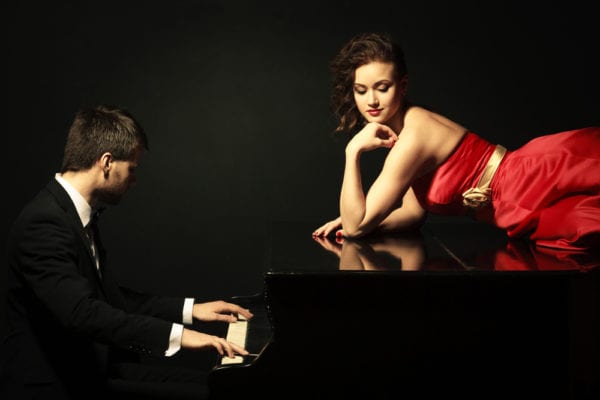Taking inspiration from a muse
Taking inspiration from a muse
Taking inspiration from a muse
-
Hannah
-
Hannah

The idea of the muse has endured since ancient times, and stories abound of the women who inspired famous works of art. Take French sculptor Auguste Rodin. His career was just beginning to take off when he met eighteen-year-old Camille Claudel, but with her as his muse, he became a famous and respected sculptor. The two had a passionate and tumultuous affair for eight years, and Camille was the subject of various sculptures by Rodin. (Earlier this week, I wrote an article featuring his famous romantic sculpture The Kiss.)
In my new book, Concerto, the hero, Umberto, is a pianist composer. He is a man of great passion and feelings, and he takes inspiration from his emotions – and the woman who stirs them within him. Early in the book, after he and Catriona go out on a romantic date, he is moved to sit at his piano and improvise. I write:
He then began to play in earnest as Catriona stood next to the piano, sipping her drink while she listened and watched Umberto’s long slender fingers move gracefully up and down the keyboard. He was wonderful, his fingers were sure, strong and dextrous. The music filled the room as passionately as moonlight filled the darkness. …
Umberto watched her face with a dreamy quality in his eyes as the music swelled and grew under his touch, a wild wind moving about restlessly. He had shifted into another key and now his playing took off, moving them both into another world with his fingertips as surely as if he had transported them physically to a land of magic. It was a world they shared, one they both knew by heart. United by their love of music, wordlessly they spoke the same language.
Umberto calls the composition ‘Songe d’une Nuit d’Amour’ (Dream of a Night of Love), and he tells Catriona, ‘It’s you that created it, Katérina. You are an infinitely powerful muse.’
But Umberto is young and ambitious, and when an offer comes to tour in America, he leaves Catriona – he leaves his muse. The two become estranged: over the ensuing years Catriona builds a career as a music therapist and raises her son alone, and Umberto, proud Umberto, loses everything – his career, his ambition, his hope – when an accident robs him of his sight.
Then Umberto’s mother hires Catriona to provide therapy for Umberto, and she must find a way to help this talented composer create music once more. She is sure that Umberto could still be the composer of his day, if only he will follow her guidance. Catriona, I write, does not believe in muses; she believes in hard work and application.
Perhaps, deep down, Catriona is protecting herself by dismissing the idea of the muse. She knows that ‘Songe d’une Nuit d’Amour’ was Umberto’s best composition, and she knows that she inspired it. But for a woman, being a muse can be a difficult responsibility to take on. After all, the painter or writer or musician takes inspiration from the muse; there is a sense of giving something of oneself. Camille Claudel, for example, did not fare well as a muse. Though she was an exceptionally talented sculptor, she was a woman in a man’s world and could never attain the recognition of her lover. Rodin would not leave his long-term lover Rose Beuret, and so Camille was the other woman; Rodin loved her but did not give her his all. Ultimately, she spent the final 30 years of her life in an asylum and died in obscurity.
Thus, both Catriona and Umberto have fears to conquer. Can Catriona give herself to Umberto completely, be honest about all she is, inspire him? In turn, can Umberto find his soul moved by Catriona, his desire and will to compose rekindled by her light?
His muse was growing tendrils in his soul in an even stronger, fiercer and more forceful way than it had done a few nights ago. Sounds that had been elusive before began to reach him – the voice of his heart … the voice of his soul … the voice of his muse. It was as if a storm was thundering in the sky, echoing through space; and his music in the next moment evoked the whistling of the wind floating over the lake and through the forest and mountains, until it reached the garden and from there into the room, reviving vague dreams of the past.
With enough adrenaline flowing through his veins to raise a tanker, Umberto lifted the piano lid. He struck a single note…